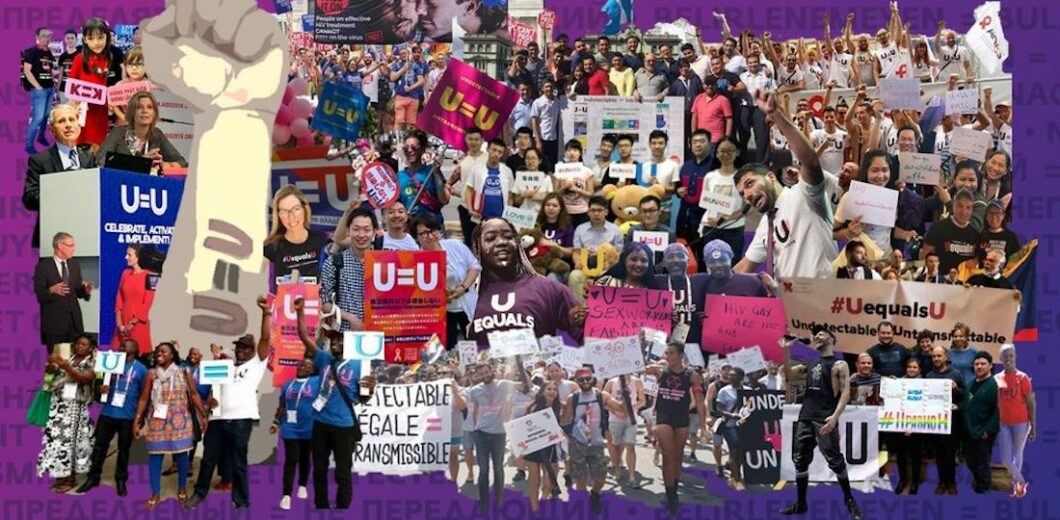The 2022 NGO report focuses on the untapped potential of U=U as a vital community-led, global HIV health equity strategy to improve the health and quality of life of people living with HIV and contribute to the global treatment targets of 95–95–95 by advancing universal access to antiretroviral therapy (ART), diagnostics and sustained care, while reducing HIV transmission.
Executive Summary
The latest UNAIDS data show that the pace of progress in preventing new HIV infections continues to slow. Alarming numbers of new infections still occur each year and far too many people living with or at risk of HIV remain without access to life-saving treatment and prevention services.
Despite the many evidence-based strategies that chart paths to “a world free from poverty, hunger, disease and want, and where all life can thrive”, too many global reports continue to show that we are not moving fast enough to end the social and structural drivers of current pandemics. In some cases, entrenched inequities are reversing hard-won gains. Widening inequalities within and between countries are a primary driver of HIV and other pandemics, including but not limited to tuberculosis, malaria, cholera, Ebola, Monkeypox and COVID-19.
Undetectable = Untransmittable (U=U) is a concept that has been endorsed by governments and diverse communities around the world. It has transformed the lives of millions of people living with and affected by HIV, and HIV prevention, testing, treatment, care and support generally. Robust evidence shows that U=U is a highly effective approach for eliminating HIV stigma and discrimination through access to information, knowledge (education) and advocacy that is tailored to local contexts and communities. U=U has been described as “one of the most effective and historic counter-narratives to HIV stigma”.
This annual report by the NGO Delegation to the UNAIDS’s Programme Coordinating Board focuses on the untapped potential of U=U as a vital community-led, global HIV health equity strategy. It describes how U=U can improve the health and quality of life of people living with HIV, key populations and other vulnerable groups1, and it underscores the fundamental role U=U can play in achieving the 95–95–95 treatment targets and in ending AIDS by 2030.
In preparing this report, it was clear that U=U means many things to many people. For the purpose of this report, U=U refers to a multimodal concept that is:
- based on biomedical evidence that a person with a suppressed viral load cannot sexually transmit HIV;
- centred on the experiences and treatment needs of people living with HIV, while supporting evidence-based combination prevention efforts for seronegative people and those who still need to learn about their status;
- an advocacy campaign that arose from the collaborative efforts of people living with HIV and leading scientists to ensure that people living with HIV have access to the latest scientific evidence that can have a direct impact on their health, well-being and quality of life;
- an expansion beyond the normative description of U=U as a biomedical and antistigma intervention to a global movement led by people living with HIV to help
support people in attaining and maintaining optimal health, while also improving outcomes in HIV prevention, diagnosis, care and treatment; and - to be recognized as a new community-led health equity policy instrument following the inclusion of U=U in the 2021 High-Level Political Declaration on HIV and AIDS.
Ending AIDS by 2030 requires ending inequality and inequity. It requires strengthening the health and community systems that can better prepare the world to prevent, identify and respond to future pandemics and health challenges.8 9 Achieving the UNAIDS global treatment targets means making good on commitments to global solidarity and ensuring universal access to quality HIV combination prevention, testing, treatment, care and support for all.
The report has six sections:
- an introduction to the topic of U=U, along with key terminology and a review of the methodology used in developing the report;
- a review of the landscape to provide context for discussion of U=U as a global, community-led HIV health equity strategy that harmonizes with the UNAIDS global treatment targets of 95–95–95 and the Global AIDS Strategy (2021–2026);
- a discussion of critical issues related to U=U and specific areas of alignment with the Global AIDS Strategy;
- a summary of key challenges and facilitators for U=U, including stigma and discrimination; ensuring enabling environments to support marginalized communities
that are not yet engaged in U=U and the HIV treatment cascade; investments in community systems, leadership and responses, including within global pandemic
prevention, preparedness and responses; and access to technology and innovation; - proposed decision points for consideration by members of the PCB; and
- 14 illustrative case studies from government and nongovernmental partners implementing U=U in regions across the world.
1) Key populations and other vulnerable groups such as, women and girls, adolescents and young people, and migrants who are disproportionately affected by HIV.
https://www.unaids.org/sites/default/files/media_asset/PCB49_Decisions_EN_.pdf
